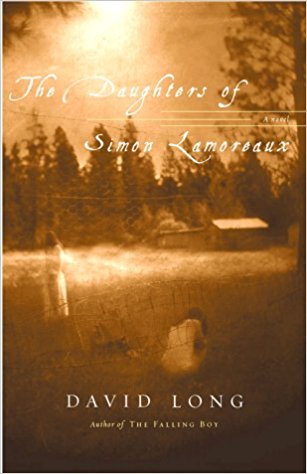David Long
David Long is the author of Blue Spruce, The Falling Boy, and The Daughters of Simon Lamoreaux. His fiction has appeared in The New Yorker, GQ, Story, and numerous other publications, and has earned him an O. Henry Award, a Pushcart Prize, a Rosenthal Prize from the American Academy of Arts and Letters, and many other honors.
BANG (Manuscript available)
THE INHABITED WORLD (2006)
New York Times Notable Book of the Year, 2006. Evan Molloy — a son, husband, and stepfather — fatally shot himself but doesn’t know why. He is stuck in a state of purgatory in the house in Washington State where he lived and died. The woman who now lives there, Maureen Keniston, is in her late thirties and is trying to restart her life after breaking off a long affair with a married man. The novel deftly moves back and forth between the story of Evan’s troubled life and Maureen’s efforts to emerge from her own purgatory. In watching Maureen’s struggles and ultimate triumph, Evan comes to see his own life and death in a completely new way.
Part psychological drama, part absorbing mystery, The Inhabited World paints a stirring portrait of a man caught between this world and the next and a woman who unwittingly offers him a sort of redemption he never could have predicted.
"Intriguing but slight psychological drama.... Long's languid prose gives a fairy tale quality to his protagonists' domestic crises."—Publishers Weekly
"The Inhabited World is worth reading for its musings on life, death, and faith in redemption."—Bookmarks
Rights: Houghton Mifflin, North America; Novo Conceito, Brazil
THE DAUGHTERS OF SIMON LAMOREAUX (2000)
Ducking out of choir rehearsal at his New England prep school, Miles Fanning rushes to a rendezvous with his girlfriend Carly. But Carly doesn't show up at the appointed time -- and is never seen again. From this haunting episode, David Long, praised for his "poetic, resonant, unpretentious" prose "(The Boston Globe)," has crafted an elegant and gripping novel about the effect of not knowing on a tragedy's survivors.
Twenty-four years later, Fanning owns an independent record label in Seattle. He is enduring a trial separation from his wife and feeling increasingly disconnected and withdrawn when he receives an anonymous e-mail message from a woman who turns out to be Carly's sister, Julia Lamoreaux. They meet at a hotel bar -- Fanning, who never gives a thought to the past, and Julia, who is obsessed by it. Then silence, until a few weeks later, when Fanning, a frequent insomniac, answers a late-night phone call. It's Julia. So begins a phone and e-mail correspondence in which Julia, chain-smoking and caustic-tongued, tells Fanning of the devastating events set into motion by her sister's never-explained disappearance: in particular, the slow demise of their deeply religious father.
Fanning is captivated, and so are we, by Julia's offbeat intensity. His heightening attraction to Julia causes old questions to flare: What "did" happen to Carly, and how was his own life altered by her fate? With precise, expert prose, award-winning writer David Long weaves a spellbinding and sensual novel that explores the workings of religious faith, the power of memory, and the redemption offered by opening oneself up to love.
On a hazy Friday in May 1973, Carolyn Lamoreaux vanishes during a high school choir practice in Hartford, Connecticut. Her boyfriend, Miles Fanning, waits disconsolately at the secret place where they'd planned to meet during lunch break, but Carly never comes. Days stretch into weeks, then months, and her disappearance is never solved. Jump ahead to Seattle, 1997, where Fanning, now in his early 40s, runs a small recording label. Recently separated, he's living out of a back room in his studio and battling insomnia when one night he receives a cryptic e-mail: "Are you the Miles Fanning who went to Griffin?" The message comes from Carly's younger sister, and soon Fanning finds himself involved in a disturbing stroll down memory lane as Julia fills him in via e-mail, over the phone, and in person on what became of the Lamoreaux family after Carly disappeared.
"In The Daughters of Simon Lamoreaux David Long has crafted an absorbing mystery, an unusual love story, and a deeply moving examination of a family collapsing under the weight of its own unspoken grief. Faith is at the center of the Lamoreaux tragedy, for Simon, the patriarch, is a deeply religious man who finds his belief in God challenged, not only by Carly's disappearance but by his Creator's deafening silence on the subject: "God knew where Carly was and wouldn't tell. Heretofore, Simon had thought of God's silence as magisterial, as a tool for quickening the organs of perception, for instilling patience. Now it felt malign." As Simon's crisis deepens, Julia draws reluctantly closer to him while her mother, Mitzi, begins to pull away. Long builds slowly to the shattering climax of Simon's fall from grace, teasing out the details over the course of several late-night telephone conversations between Julia and Miles and the occasional lengthy e-mail. In less skilled hands such devices would quickly pall, seem contrived, but the secret to this novel's success lies in its author's impeccable timing, stellar prose, and considerable talent for drawing unique, quirky characters that hold the reader spellbound. In fact, it's only fair to issue a caveat to potential readers: don't start this novel unless you have plenty of time to finish it, because once The Daughters of Simon Lamoreaux has you in its thrall, it's almost impossible to put down." --Alix Wilber, Amazon.com
The Daughters of Simon Lamoreaux has the propulsive power and mystery of a Gothic romance, but the world it creates is a complicated and contemporary one.—The New York Times Book Review, Andrew O'Hehir
"Billy Collins author of Picnic, Lightning From the question mark of its opening riddle to the exclamation point of its final revelation, David Long's new novel sustains an ability to hold its reader hostage. A story of two strangers in the night on a quest to understand first the past, then one another, The Daughters of Simon Lamoreaux is a tense, deeply nocturnal tale of intrigue -- smartly written and always true to the essential mysteriousness of experience."—Review
Rights: Scribner, World English
THE FALLING BOY (1997)
In a small Montana town in the 1950s and 60s, a young carpenter discovers himself being drawn into the tensions and joys of family life. Marc Singer's marriage to Olivia, one of the four Stavros sisters, opens the door to new feelings and experiences he has never encountered before. Raised by his grandmother, he is a stranger to the teasing humor and smoldering resentments that preside at the Stavros dinner table. Olivia and her sisters are vastly disparate from each other; one is serious and steadfast; one dutiful; another romantically unstable; and one enigmatic. Mark takes great pleasure watching the sisters interact, the oldest of whom slowly begins to cast a spell over him. The two embark on an illicit affair, and as events lurch out of control, threatening to unravel this closely knit family, Mark has no choice but to confront the nature of marriage and desire.
"David Long's luminous debut novel The Falling Boy begins with a wedding of two lovers and ends with the reconciliation of two sisters. In between, Long charts the turbulent inner life of his protagonist, Mark Singer, a young man without a family who finds one in the exuberant Stavros clan, proprietors of a café in a small Montana town. Widower Nick Stavros and his four daughters welcome Mark into their fold, and eventually Mark marries Olivia, the most serious of the sisters. For a while, life seems just about perfect. Then Olivia's oldest sister, Linny, comes home from San Francisco, and the unwitting Mark is drawn into a long-standing rivalry between the sisters."—Amazon.com
If an affair between Mark and Linny is inevitable, the results of their betrayal are unexpected. In The Falling Boy, the flesh is occasionally weak, but love is tougher than we might think. When Olivia emerges from her final confrontation with her sister, she is triumphant--not over Linny, "but over the forces that fling people apart." In sure, lyrical prose and with gentle humor and compassion for all his characters, David Long offers up a profound exploration of the human capacity to love, hurt, and forgive.
"Not since John Updike's Marry Me, perhaps, has there been such an honest and unflinching moral examination of marital infidelity as this finely crafted novel by the author of the prize-winning story collection Blue Spruce....While many readers will recognize this real-life scenario, Long displays a deft hand in dealing with it. And in the process, he manages to unearth some powerful truths about love, family, and the "forces that fling people apart." Recommended."—Library Journal
Rights: Scribner
BLUE SPRUCE (1996)
"Twelve precise, thoughtfully written and strangely seductive stories describe a world filled with misfits and maimed souls with gaping spiritual holes. Witness the mysteriously estranged brother in "Perro Semihundido" (the title of a Goya painting), who has neglected to tell his sister about the love affair that is central to his life. Or Marly Wilcox, the young protagonist of the brilliant "Attraction," who slides into a loveless romantic quadrangle for no particular reason. Or the two lonely, desperate older women of the title story, sisters-in-law who just can't seem to come to grips with their past. The stories, which take place in rural Montana, Massachusetts and Washington, are so perfectly fitted to their settings that they are unimaginable in any other places. They come alive at unexpected moments with a sudden forcefulness: a surprise surges through a matter-of-fact description like a lightning bolt, as when a teenage girl coolly gouges out her classmate's eye. Long's (Early Return) voice has an unerring pitch, and his insight is equally impressive: his characters have no hopes except for the possibility of love. The narrator of "Perfection," a high school girl who witnesses a murder, describes what she wants from love: "It would have to be good and strong, it would need to carry all the weight in the world." Long is a true craftsman who measures that weight and its burden on the lives of ordinary people who are looking for a way to survive."—Publishers Weekly
"This vibrant collection by Montana writer Long manages what only the best short stories can claim: each story engages you enough that you wish it wouldn't end so soon. The people and the locales are sharply drawn: in "Perfection," a high school girl accidently witnesses a brutal beating outside a bar while waiting to pick up her football player boyfriend. In the title story, two aging sisters-in-law, Eva and Laurel, quietly struggle for control of the family homeplace they share after the suicide of Eva's husband, Laurel's brother."—Library Journal
Rights: Scribner, World English




